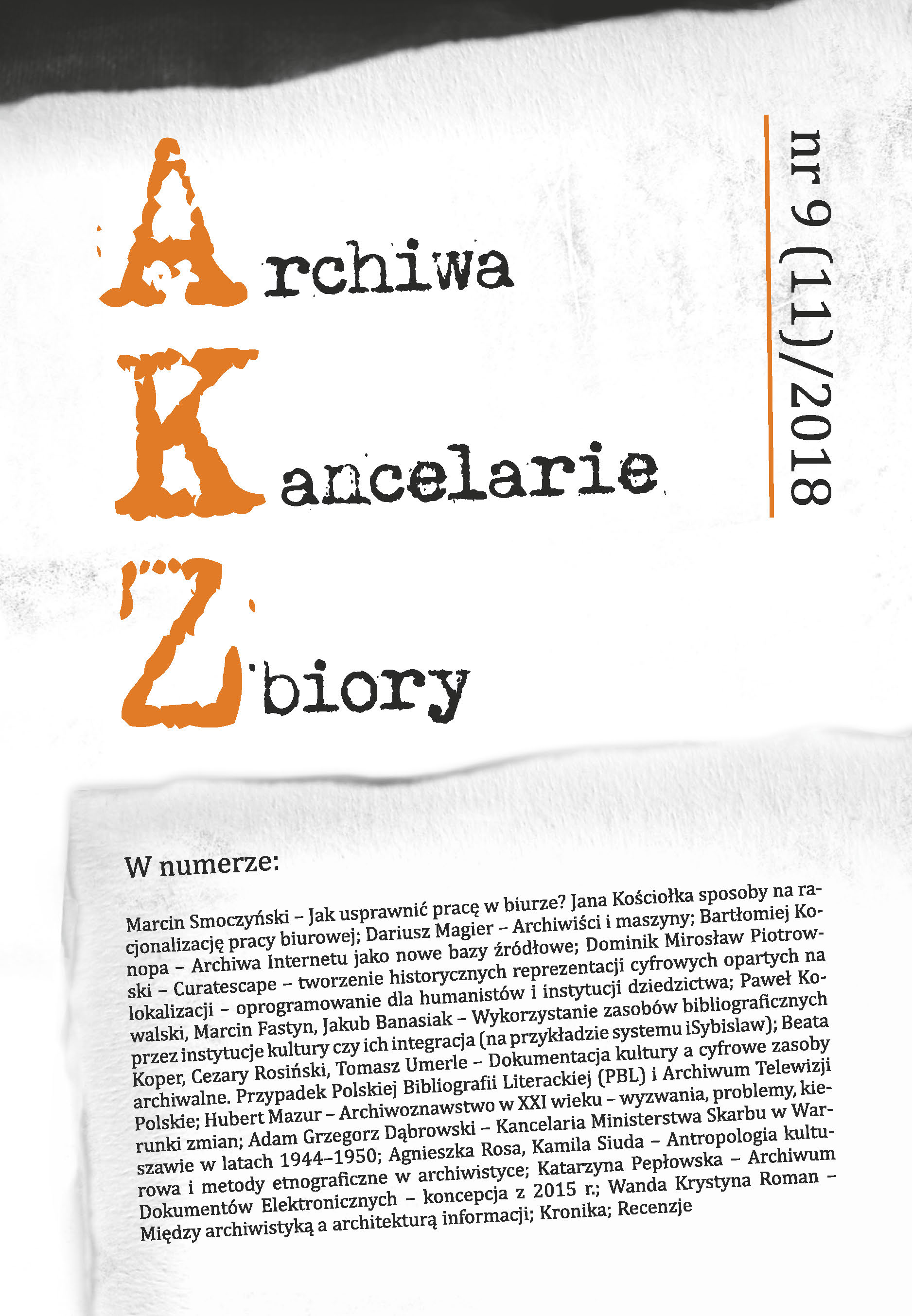Wykorzystanie zasobów bibliograficznych przez instytucje kultury czy ich integracja (na przykładzie systemu iSybislaw)
DOI:
https://doi.org/10.12775/AKZ.2018.005Słowa kluczowe
baza bibliograficzna, system informacyjno-wyszukiwawczy, instytucja kultury, iSybislawAbstrakt
W artykule przedstawiono refleksję nad stanem i perspektywami współpracy między twórcami współczesnych bibliografii w środowisku cyfrowym a instytucjami kultury, takimi jak: wydawnictwa, biblioteki, repozytoria, archiwa. Wskazano perspektywy i rozwiązania wybranych problemów dotyczących współpracy między tymi podmiotami na przykładzie tworzonego w Instytucie Slawistyki PAN systemu informacyjno-wyszukiwawczego iSybislaw. Zasoby informacyjne systemu wykorzystywane są w wydawnictwach naukowych (Wydawnictwo Instytutu Slawistyki PAN), różnego typu repozytoriach tekstów pisanych i mówionych, bibliotekach i portalach instytucjonalnych. Omówione zostały modele integracji tych zasobów. Rozważania prowadzą do wniosków, że obecnie, gdy coraz więcej bibliografii funkcjonuje w środowisku cyfrowym, konieczna jest ścisła współpraca i integracja z instytucjami kultury. Pozwala ona zwiększyć grono odbiorców informacji bibliograficznej, która stanowi skarbnicę wiedzy i dziedzictwa kulturowego. W przypadku systemu iSybislaw dzięki integracji zwiększa się grono odbiorców tematów i nurtów związanych z badaniami wszystkich języków słowiańskich. W zastosowanym w systemie języku słów kluczowych możliwe jest pokazanie bogactwa terminologii we wszystkich językach słowiańskich, rozwoju slawistyki na przestrzeni dziejów, trendów we współczesnej Słowiańszczyźnie. Związków – coraz szerszych – językoznawstwa z innymi naukami, w tym m.in. z antropologią, socjologią, psychologią, historią, nauką o literaturze, kulturoznawstwem.
Bibliografia
Bojar, Bożenna, Zofia Rudnik-Karwatowa. „Koncepcja nowoczesnego systemu informacji slawistycznej.” W Językoznawstwo: prace na XII Międzynarodowy Kongres Slawistów w Krakowie 1998, red. Hanna Dalewska-Greń, Jerzy Rusek, Janusz Siatkowski, 41–47. Warszawa: Energeia, 1998.
Kłoskowska, Antonina. Socjologia kultury. Warszawa: Wydawnictwo Naukowe PWN, 2007.
Ley, Michael, Patrick Reuter. „Maintaining an Online Bibliographical Database: The Problem of Data Quality.” Extraction et gestion des connaissances 6, t. 2 (2006): 5–10.
Przastek-Samokowa, Maria. „Czym jest humanistyka cyfrowa? Pole semantyczne pojęcia (zarys).” Zagadnienia Informacji Naukowej. Studia Informacyjne 54, nr 2 (2016): 82–93.
Szlendak, Tomasz, Jacek Nowiński, Piotr Wieczorek. Podręcznik szkoleniowy dotyczący sektora kultury w Polsce dla wnioskodawców i partnerów Programu „Promowanie różnorodności kulturowej i artystycznej w ramach europejskiego dziedzictwa kulturowego” finansowanego z funduszy EOG 2009–2014. Warszawa 2012. www.eog2016.mkidn.gov.pl/modules/download_gallery/dlc.php?file=31&id=1419978328&sid=14.
Woźniak-Kasperek, Jadwiga. „Bibliografia w cyfrowej przestrzeni informacyjnej.” Studia z Filologii Polskiej i Słowiańskiej 49 (2014): 14–27. https://doi.org/10.11649/sfps.2014.005.
Pobrania
Opublikowane
Jak cytować
Numer
Dział
Statystyki
Liczba wyświetleń i pobrań: 593
Liczba cytowań: 0



